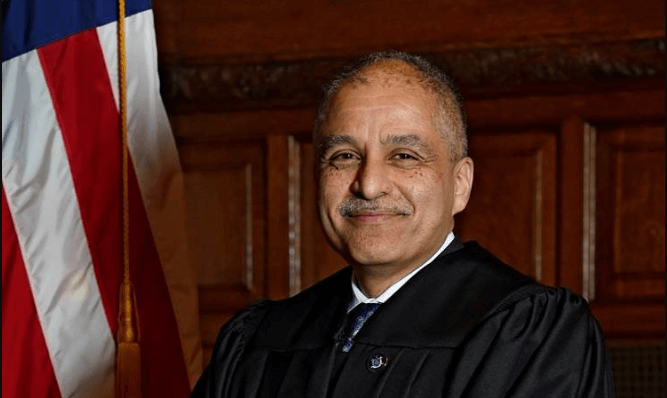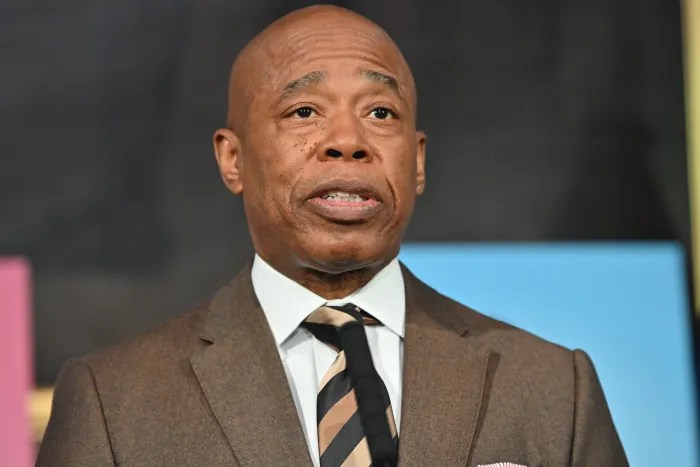Governor Kathy Hochul’s nominee for Chief Judge of the Court of Appeals, Rowan Wilson, was voted through the Senate Judiciary Committee on Monday en route to a vote by Albany’s full upper chamber, after enduring a far lower-key hearing than the governor’s prior nominee, Hector LaSalle.
Wilson, who would be the first Black leader of the top court and state judicial system, was easily approved by the committee, with all present Democrats voting in favor, four Republicans giving a thumbs down, and one Republican, Andrew Lanza of Staten Island, opting not to make a recommendation. Wilson’s nomination will now go before the full Senate.
“After today’s hearing, I’m confident that Rowan Wilson is the best person to lead New York’s highest court during this challenging time for the judicial branch in our state and nation,” Judiciary Committee Chair Brad Hoylman-Sigal, a Manhattan Democrat, said in a statement following the three-hour hearing.
“Over the last four years and through hundreds of opinions, Judge Wilson has proven himself to be an exceptional and fair-minded jurist with a strong record on civil rights, labor, environmental justice, the right to privacy and tenants’ rights,” the chair continued. “His leadership and thoughtful jurisprudence stands in stark contrast to the radical and reactionary dreck emanating from the U.S. Supreme Court and many other federal courts.”
Wilson has served as an Associate Justice on the Court of Appeals since 2017, and has gained a reputation as one of its most liberal legal minds. That reassured Senate Democrats intent on molding the top court as a buffer of sorts against an increasingly-right-wing US Supreme Court, and in remaking the Court of Appeals following the tenure of former Chief Judge Janet DiFiore, who was also seen as lurching the court to the right.
The contrast couldn’t have been starker between Monday’s hearing and the hourslong January whirlwind for LaSalle, which saw the jurist grilled on his judicial record before being voted down, precipitating a political and legal battle that ended in a rejection by the full Senate, a court ruling requiring nominees be voted by the entire body, and a major political embarrassment for Hochul.
Instead, Wilson — who was the first Black partner at white-shoe law firm Cravath and then chair of public defense agency Neighborhood Defender Service of Harlem, before joining the high court — got to speak at length about his vision for the Court of Appeals and the sprawling state court system.
Wilson, known for his colorful and frequent dissents and praised for his plainspoken legal writing, critiqued the DiFiore Court for hearing a diminishing number of cases compared to predecessors and said he would encourage lower court judges to send cases their way. “It’s very difficult to be the nationally preeminent court of any kind if you’re deciding fewer and fewer cases,” he said.
He also endorsed expanding the state’s diversion courts to keep people out of jail, and said that the court system should strive to keep people out of jail if incarceration isn’t necessary.
But the judge mostly tried to steer clear of political red meat, instead seeking to portray himself as a justice above the fray, perhaps hoping to settle questions of his impartiality after LaSalle’s rejection over his conservative jurisprudence.
“My job and the job of my colleagues on the court is to follow the law to an answer, not to construct a path to a predetermined endpoint,” he said, opining that the court should not explicitly view its work as political.
Wilson’s past rulings
The closest thing Wilson faced to bipartisan scrutiny was his majority opinion just a month ago in People v. Regan, where the court reversed the 2015 conviction of Andrew Regan, who had been found guilty of raping a woman in 2009. Though Wilson made it known at the hearing that he believes Regan was guilty, he and the court’s majority reversed his conviction on procedural grounds, arguing local prosecutors dragged their feet on collecting DNA evidence and violated Regan’s constitutional right to a speedy trial.
The offender was cut loose years before the end of his sentence, a move that the victim told the New York Post was “devastating.” The ruling drew condemnation from the National Organization for Women’s New York City branch, with executive director Sonia Ossorio saying the decision “shocks the conscience” and reflects poorly on Wilson.
But Wilson said it was a matter of constitutional rights, not of guilty vs. innocent, chastising the local DA and drawing a comparison to the landmark 1966 Supreme Court decision Miranda v. Arizona, which reversed a rapist’s conviction but enshrined in law that defendants being interrogated must be read their constitutional rights, now known ubiquitously as Miranda rights.
“You always end up hurting the victim in a particular case when you reverse the conviction of someone who is guilty. The reason you do that is because there are constitutional rights,” said Wilson. “You are not vindicating them for the victim. You’re nominally vindicating them for [the defendant], but you’re really vindicating them for everybody else.”
Another recent case Wilson touched upon was that of Happy the Elephant, whom animal rights activists sought to have released from the Bronx Zoo to a sanctuary on the grounds she was being unlawfully detained. The Court of Appeals ruled last year that Happy wasn’t entitled to challenge her detention on the grounds of habeas corpus, against Wilson’s dissent — the longest in the history of the Court of Appeals.
The jurist assured lawmakers that “an elephant is not a person” and thus their rights aren’t constitutionally protected as are human rights. Still, he opined that animals do have rights constructed and protected by jurists and lawmakers, arguing that activists should at least have the right to challenge the elephant’s captivity.
“The question is not should animals have some sort of rights, the question is how do they go about acquiring those rights? And is it something a court should do,” he said. “It isn’t about Happy the elephant, it’s much more about you and me.”
It’s unclear when Wilson’s nomination will go to the full Senate floor, but it could happen as early as this week. Hochul also nominated attorney Caitlin Halligan to fill Wilson’s seat as an associate justice; her confirmation hearing will take place Tuesday.
“During today’s hearing Judge Wilson demonstrated his strong qualifications and shared his vision for the Court of Appeals,” said Hochul spokesperson Avi Small. “Governor Hochul looks forward to a vote from the full Senate on his nomination.”


































